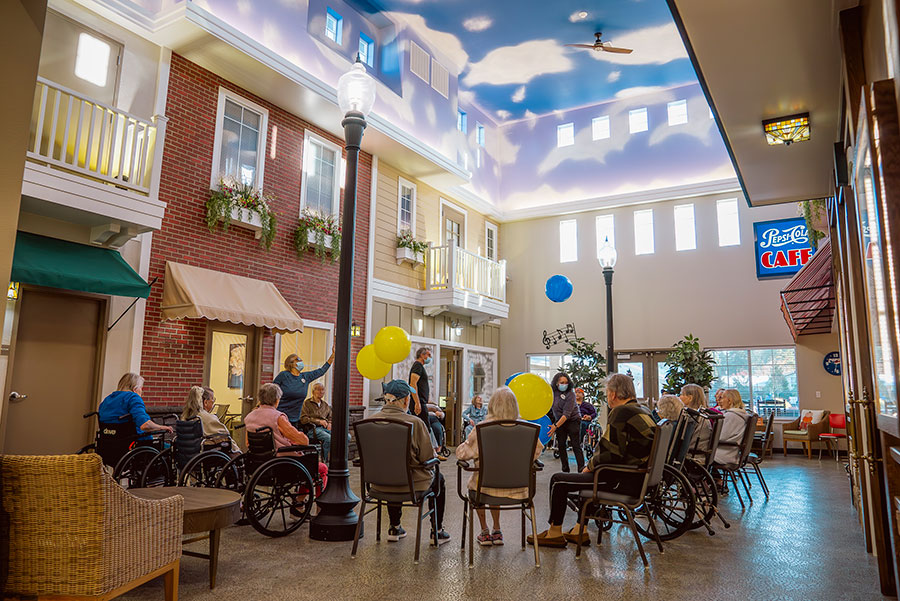The Impact of Personalized Memory Care on Cognitive Health
The Impact of Personalized Memory Care on Cognitive Health
Blog Article
Everything About Memory Treatment Providers: Why Tiny Memory Treatment Houses Are an Excellent Option
Memory care services play an essential duty in sustaining people with Alzheimer's and mental deterioration. Little memory care homes stand apart for their tailored technique and intimate setting. With lower staff-to-resident proportions, these homes foster more powerful connections and customized treatment. Homeowners take advantage of enhanced social communications and a risk-free atmosphere. As families explore alternatives, comprehending the distinct benefits of little memory care homes becomes crucial. What factors should be taken into consideration when selecting the appropriate home?
Comprehending Memory Care Solutions
While many might recognize with basic senior care choices, recognizing memory treatment services is essential for households encountering the difficulties of cognitive decline. Memory care particularly satisfies individuals with problems such as Alzheimer's disease and various other kinds of mental deterioration. These services offer an organized environment that concentrates on boosting the high quality of life for homeowners through specialized treatment and support.Memory treatment facilities are developed to assure safety and protection, usually including protected settings to stop roaming. Trained employee are offered all the time to assist with everyday activities, medication administration, and personal care. In addition, memory care programs frequently consist of cognitive stimulation tasks, tailored to engage homeowners and promote psychological wellness. Families can gain from comprehending these solutions, as they make it possible for informed choices concerning their liked ones' treatment, making certain that their details needs and choices are addressed in a helpful and caring manner.
The Advantages of Small Memory Care Residences
Small memory treatment homes use distinctive benefits that can substantially boost the top quality of life for homeowners with cognitive problems. One substantial advantage is the intimate atmosphere, which enables individualized interactions among team and citizens. This smaller sized setting fosters meaningful relationships, minimizing sensations of isolation and stress and anxiety commonly experienced by people with memory issues.Additionally, the reduced staff-to-resident proportion in little memory care homes makes it possible for caretakers to supply more attentive guidance and assistance. This method not just improves safety yet additionally promotes a sense of safety and security for the residents.Moreover, small memory treatment homes can adapt rapidly to the one-of-a-kind requirements and choices of each resident, enabling a much more homelike environment. Such an atmosphere can encourage social interaction and participation in tasks, eventually improving the day-to-day experiences of those coping with cognitive disabilities.
Personalized Care Plans for Locals
Personalized treatment strategies are vital in memory treatment homes, as they deal with the distinct demands and preferences of each homeowner. These plans start with complete assessments carried out by competent specialists, who evaluate cognitive capabilities, clinical background, and individual rate of interests. This customized method warranties that care is not only efficient but likewise considerate of each person's self-respect and autonomy.Moreover, customized care strategies are adaptable, allowing adjustments as citizens' needs progress over time. This flexibility fosters a complacency and experience, which is important for individuals dealing with memory challenges. Caregivers are educated to implement these strategies constantly, offering assistance that straightens with the residents' regimens and preferences.Ultimately, individualized treatment plans improve the top quality of life for residents by promoting well-being, independence, and involvement, making them a basic facet of memory treatment solutions in little memory care homes.
Creating a Home-Like Environment
Developing a home-like environment is crucial for cultivating comfort and knowledge in memory care setups, as it substantially affects locals' psychological health. Small memory treatment homes commonly focus on customized touches, such as warm shade combinations, family images, and familiar furnishings plans, which help residents really feel much more comfortable. Incorporating elements evocative a standard home, like comfortable space and common locations, encourages a sense of belonging.Moreover, using all-natural light and outdoor rooms can enhance the environment, advertising relaxation and harmony. Staff members play a substantial function in keeping this atmosphere by involving with locals in a thoughtful way, treating them like family members. Routine activities, such as food preparation or horticulture, can also contribute to a home-like feeling, supplying opportunities for residents to take part in significant experiences. Generally, creating a nurturing atmosphere supports cognitive function and emotional stability, making it an important element of memory care solutions.
Boosted Social Communication and Neighborhood
Boosted social communication and neighborhood are crucial components of memory care solutions. By promoting customized social involvement and creating a family-like atmosphere, these services promote purposeful links amongst residents. Group occasions and read this article tasks further motivate involvement, assisting individuals feel more included and sustained.
Individualized Social Involvement
While social communication is essential for total well-being, many individuals with memory disabilities commonly battle to engage meaningfully with others. Personalized social involvement in memory treatment homes addresses this difficulty by creating tailored activities that satisfy residents' distinct rate of interests and capabilities. By concentrating on specific choices, caregivers can foster links that reverberate deeply with each person. Tasks such as art treatment, songs sessions, and directed conversations advertise cognitive stimulation and emotional expression. In addition, tiny group settings urge sociability and enable for more intimate interactions, boosting feelings of belonging. This strategy not only combats sensations of isolation yet likewise empowers locals to maintain a feeling of identity, eventually contributing to boosted mental health and lifestyle.
Family-like Environment
In a memory care setup, promoting a family-like atmosphere substantially boosts social interaction and builds a feeling of neighborhood amongst homeowners. Smaller memory treatment homes commonly prioritize intimate settings, allowing citizens to create closer links with one another and personnel. This nurturing environment promotes trust, which is necessary for people with memory disabilities. Locals are more probable to engage in discussions and share experiences, developing a supportive network that reduces sensations of isolation. The experience of shared areas and regimens adds to a sense of belonging, further motivating social communication (personalized memory care). In such setups, psychological bonds flourish, leading to enhanced total well-being and a better of life for residents as they browse their day-to-day experiences with each other
Team Activities and Occasions

Safety And Security and Security Attributes in Little Houses
Numerous little homes created for memory treatment include necessary security and protection attributes to ensure the health of citizens. These homes commonly make use of safe and secure access and exit factors to avoid roaming, a common concern among people with memory impairments. Additionally, security systems and alarm system mechanisms improve monitoring, making certain that staff can quickly react to any unusual activities.Interior formats are tailored for security, with reduced hazards such as clutter-free pathways and sharp edges. Handrails and non-slip floor covering are typically mounted to minimize the danger of falls. Employee are learnt emergency procedures, ensuring they are gotten ready for various situations.Moreover, individualized care strategies might include analysis of private safety demands, supplying tailored solutions for every homeowner. Overall, these safety and protection attributes produce a nurturing atmosphere where residents can grow while preserving their dignity and independence.
Exactly how to Choose the Right Memory Treatment Home
How can family members guarantee they choose one of the most ideal memory care home for their liked ones? The choice requires cautious factor to my sources consider of a number of variables. Households must review the center's team credentials and training, ensuring that caregivers are experienced in managing memory-related conditions. Next, it's crucial to analyze the home's setting, concentrating on safety and security features and whether it fosters a sense of community and belonging. Going to the facility can provide insight right into daily tasks and the social atmosphere, which are important for mental excitement and emotional wellness. Additionally, family members must make inquiries concerning the treatment strategies provided, ensuring they are customized to private demands. Ultimately, considering the home's location and ease of access for household visits can add to a smoother change. By resolving these aspects, families can make an informed choice that prioritizes their liked one's comfort and top quality of life in a memory care setting.
Regularly Asked Concerns
What Qualifications Should Personnel Members in Memory Care Houses Have?
Personnel in memory treatment homes should have pertinent certifications, experience in dementia care, strong communication skills, and concern. Continuous training in behavioral management and restorative treatments boosts their capacity to sustain citizens successfully.
Just How Do Memory Treatment Solutions Differ From Traditional Assisted Living?
Memory care solutions concentrate particularly on people with memory impairments, providing customized support and structured settings. In comparison, conventional assisted living supplies basic support with everyday activities, lacking the tailored approach required for those with cognitive difficulties.
What Kinds of Activities Are Provided in Memory Treatment Houses?
Memory treatment homes normally provide a variety of home tasks created to engage homeowners. Usual choices include art treatment, songs sessions, cognitive video games, exercises, horticulture, and social events, all targeted at enhancing wellness and cognitive function.
Can Citizens Bring Their Own Possessions to Memory Treatment Homes?
Homeowners can commonly bring their own items to memory care homes, allowing them to personalize their space - personalized memory care. This technique aids produce an acquainted setting, promoting convenience and a sense of identity for the people

Exactly How Are Household Members Associated With the Treatment Refine?
Member of the family play an essential role in the treatment process, usually taking part in decision-making, participating in treatment meetings, and providing emotional assistance. Their participation promotes a joint setting, boosting the resident's overall wellness and top quality of life. While several may be familiar with basic elderly treatment choices, recognizing memory care solutions is vital for households dealing with the difficulties of cognitive decrease. These services offer a structured atmosphere that focuses on enhancing the quality of life for locals with specialized care and support.Memory care facilities are developed to guarantee safety and security and safety, usually including protected environments to stop wandering. Customized care plans are essential in memory treatment homes, as they provide to the distinct demands and choices of each homeowner. Team participants in memory care homes must possess appropriate accreditations, experience in mental deterioration treatment, solid communication skills, and concern. Memory care solutions concentrate specifically on individuals with memory impairments, giving specialized support and structured environments.
Report this page